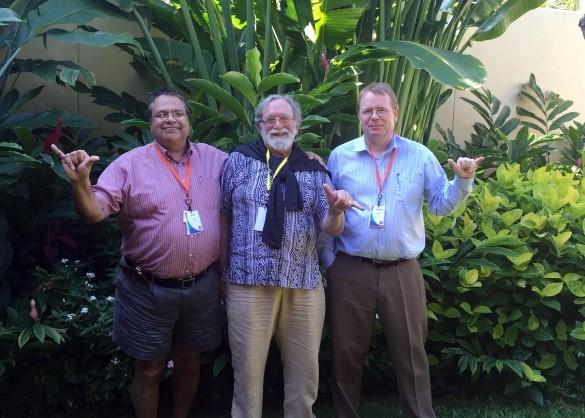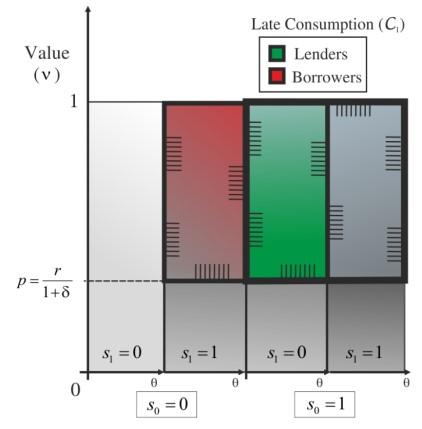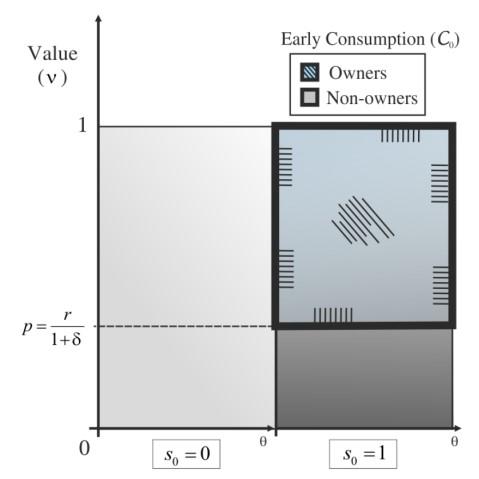New Results on Sharing Economy Presented at HICSS 2016

© 2016 EPFL
Prof. Weber presented his latest research results on “Optimal Retail in a Sharing Economy” at the 49th Hawaiian International Conference on System Sciences (HICSS) on January 8, 2016. The paper examines the impact of sharing markets on the price, supply, and demand of goods in a dynamic setting.
 Together with professors Eric K. Clemons (Wharton School; middle), Rajiv Dewan (University of Rochester; left), and Robert J. Kauffman (Singapore Management University; not in photo), Prof. Weber (right) has been organizing a HICSS mini-track on the economics of information systems since 2009. This year’s minitrack on “Society, Information, Technology, and Economics” featured selected papers and presentations about the impact of information systems at the societal level. A special section of the Journal of Management Information Systems (JMIS), co-edited by Clemons, Dewan, Kauffman, and Weber, to appear later in 2016, will feature a number of full-length papers developed from the HICSS mini-track, including the journal version of Prof. Weber’s conference paper.
Together with professors Eric K. Clemons (Wharton School; middle), Rajiv Dewan (University of Rochester; left), and Robert J. Kauffman (Singapore Management University; not in photo), Prof. Weber (right) has been organizing a HICSS mini-track on the economics of information systems since 2009. This year’s minitrack on “Society, Information, Technology, and Economics” featured selected papers and presentations about the impact of information systems at the societal level. A special section of the Journal of Management Information Systems (JMIS), co-edited by Clemons, Dewan, Kauffman, and Weber, to appear later in 2016, will feature a number of full-length papers developed from the HICSS mini-track, including the journal version of Prof. Weber’s conference paper.
A Dynamic Economy with Overlapping Generations of Consumers. The model considers consumers that can be  heterogeneous with respect to both their subjective likelihood of need for a certain item (e.g., a power drill) and their value for having the item should there be a need. While a sharing market presents an alternative to buying, it also allows owners to lend the item in case they do not need it in the future. Consumers, in their early consumption phase (C0) can rent or buy the item, and in their late consumption phase (C1) they face the same decision. The best consumption decision for any given consumer will depend on his subjective likelihood of need and his subjective value of the item, as well as
heterogeneous with respect to both their subjective likelihood of need for a certain item (e.g., a power drill) and their value for having the item should there be a need. While a sharing market presents an alternative to buying, it also allows owners to lend the item in case they do not need it in the future. Consumers, in their early consumption phase (C0) can rent or buy the item, and in their late consumption phase (C1) they face the same decision. The best consumption decision for any given consumer will depend on his subjective likelihood of need and his subjective value of the item, as well as  the realization of his (random) personal need in the current
the realization of his (random) personal need in the current  time period. The presence of a sharing market changes the consumer incentives in a somewhat ambiguous manner. On the one hand, a sharing market increases the perceived value of a good because an owner does not have to fear the possibility of not having any use for the item later, should there be no need for it. Indeed, an owner can always rent out the item on the sharing market. All else equal, this tends to increase the incentives for ownership. On the other hand, a sharing market is an alternative to getting access to an item, and a potential buyer may therefore be less motivated to own an item than without a sharing market.
time period. The presence of a sharing market changes the consumer incentives in a somewhat ambiguous manner. On the one hand, a sharing market increases the perceived value of a good because an owner does not have to fear the possibility of not having any use for the item later, should there be no need for it. Indeed, an owner can always rent out the item on the sharing market. All else equal, this tends to increase the incentives for ownership. On the other hand, a sharing market is an alternative to getting access to an item, and a potential buyer may therefore be less motivated to own an item than without a sharing market.
Optimal Retail with or without Sharing. Given the complex incentives for and against ownership, Prof. Weber’s contribution shows that retailers tend to increase prices when there is a sharing market. For goods which are relatively cheap to produce, they prefer no sharing market, whereas when goods are expensive to make, a sharing market tends  to increase a retailer’s or manufacturer’s profit. The stylized model in the paper allows for a detailed analysis of the impact sharing markets have on the incentives of consumers and manufacturers of goods. It allows addressing complex questions, relating from the design of products for durability to possible regulatory interventions that may favor the existence of sharing markets or not.
to increase a retailer’s or manufacturer’s profit. The stylized model in the paper allows for a detailed analysis of the impact sharing markets have on the incentives of consumers and manufacturers of goods. It allows addressing complex questions, relating from the design of products for durability to possible regulatory interventions that may favor the existence of sharing markets or not.
Upcoming Presentations. Prof. Weber has been invited to present his research on the sharing economy at the upcoming annual workshop on Theory in Economics of Information Systems (TEIS), which will take place in March 2016. The next HICSS conference, in January 2017, will celebrate its 50th anniversary; it will also be the 30th anniversary of the SITE mini-track, organized by professors Clemons, Dewan, Kauffman and Weber, and expected to feature a number of special guests and events.
Reference
Weber, T.A. (2016) “Optimal Retail in a Sharing Economy,” Proceedings of the 49th Annual Hawaii International Conference on System Sciences (HICSS), IEEE Computer Society, Washington, DC, pp. 5230—5238.
Links
• News Release on Collaborative Consumption, EPFL, July 2014
• News Release on the Sharing Economy, EPFL, January 2015
• HICSS-49 Conference Program, Hawaii, USA, January 2016
• Workshop on Theory in Economics of Information Systems (TEIS), March 2016
Links
- Chair OES of Prof. Thomas Weber
- HICSS-49 Conference Program, Hawaii, USA, January 2016
- More Information about OES
- News Release on Collaborative Consumption, EPFL, July 2014
- News Release on the Sharing Economy, EPFL, January 2015
- Workshop on Theory in Economics of Information Systems (TEIS), March 2016